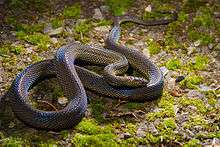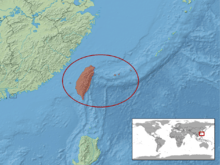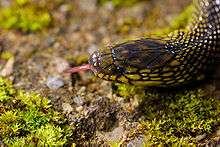Achalinus formosanus
Achalinus formosanus, common name Formosan odd-scaled snake or Taiwan burrowing snake, is a non-venomous snake in family Xenodermatidae[3] that is found in Taiwan and in the southern Ryukyu Islands (Japan).[1][4][5]
| Achalinus formosanus | |
|---|---|
 | |
| Achalinus formosanus formosanus | |
| Scientific classification | |
| Kingdom: | Animalia |
| Phylum: | Chordata |
| Class: | Reptilia |
| Order: | Squamata |
| Suborder: | Serpentes |
| Family: | Xenodermidae |
| Genus: | Achalinus |
| Species: | A. formosanus |
| Binomial name | |
| Achalinus formosanus | |
 | |
| Synonyms | |
|
Achalinopsis sauteri Steindachner, 1913 | |
Taxonomy
There are two subspecies:[4]
- Achalinus formosanus formosanus Boulenger, 1908 — Taiwan
- Achalinus formosanus chigirai Ota and Toyama, 1989 — Ryukyu Islands[6]
Specific name formosanus means "from Formosa", referring to the fact that this species was first described from a specimen from Taiwan.[4] chigirai refers to Yoshinori Chigira, who collected the first specimen of Achalinus formosanus chigirai.[6]
Achalinus formosanus formosanus is ecologically and morphologically similar to the Taiwan endemic Achalinus niger;[7] the two differ in some scale counts and characteristics.[6] A study using genetic markers found these two taxa to be overlapping, warranting further studies on their taxonomy.[7]
Distribution
Achalinus formosanus formosanus is known from central and southern Taiwan at elevations of 1,000–2,000 m (3,300–6,600 ft) asl.[5] Achalinus formosanus chigirai occurs at low altitudes (below 200 m (660 ft)) on the Iriomote-jima and Ishigaki Islands, both belonging to the Yaeyama Group.[8]
Description

Achalinus formosanus is a small snake growing to a total length of about 90 cm (35 in). The whole body is iridescent under light. Head is small, oval, and without distinct neck. Body is slender and tail is moderately short. Eyes are small, bead-like; iris is black and indistinct. Upper head, body and tail is uniform olive, grayish tan, or black. Mid-dorsal row of scales on body and tail show a dark longitudinal line. Ventral surface is olive-yellow or dark gray. The young are usually black.[5]
Behaviour
It is a nocturnal, terrestrial snake that probably preys on earthworms, slugs, and frogs. It is non-venomous and not aggressive. It is oviparous.[5]
Habitat and conservation
Achalinus formosanus formosanus are found in montane humid forests, where they live in dark, wet micro-habitats such as the forest floor, rotten wood, and leaf litter.[1][5] Achalinus formosanus chigirai have been collected in on a road at night and in a limestone cave in the daytime[6] as well as in low grass along a path in the evening and on forest floor at night.[8]
No significant threats are known.[1] It is not a protected species in Taiwan,[5] but Achalinus formosanus chigirai is classified as "near threatened" in Japan.[4]
References
- Zhou, Z. & Lau, M. (2012). "Achalinus formosanus". IUCN Red List of Threatened Species. 2012: e.T192148A2047257. doi:10.2305/IUCN.UK.2012-1.RLTS.T192148A2047257.en.
- Boulenger, G. A. (1908). "Description of a new frog and a new snake from Formosa". Annals and Magazine of Natural History. 8 (2): 221–222.
- In earlier classifications sometimes still in use, subfamily Xenodermatinae, family Colubridae. See e.g. "Xenodontinae Cope, 1895". Integrated Taxonomic Information System. Retrieved 1 November 2015.
- Achalinus formosanus at the Reptarium.cz Reptile Database. Accessed 1 November 2015.
- Hans Breuer & William Christopher Murphy (2009–2010). "Achalinus formosanus formosanus". Snakes of Taiwan. Retrieved 1 November 2015.
- Ota, Hidetoshi; Toyama, Masanao (1989). "Taxonomic re-definition of Achalinus formosanus Boulenger (Xenoderminae: Colubridae: Ophidia), with description of a new subspecies". Copeia. 1989 (3): 597–602. doi:10.2307/1445485. JSTOR 1445485.
- Shie, Jia-Rung (2006). Phylogeography of Odd-scaled Snake Achalinus in Taiwan (PDF). Masters thesis, National Sun Yat-sen University. p. 53.
- Ota, Hidetoshi; Toyama, Masanao (1989). "Two additional specimens of Achalinus formosanus chigirai (Colubridae: Ophidia) from the Yaeyama Group, Ryukyu Archipelago". Japanese Journal of Herpetology. 13 (2): 40–43.
